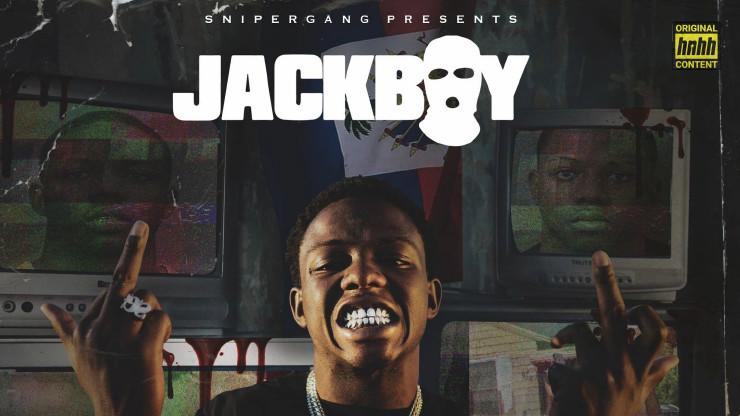Kodak Black’s spirit is alive and well on Jackboy, while Sniper Gang’s second-in-command holds down the vision on his most polished project to date.
There has been a void in the rap game since Kodak Black was locked up nearly a year ago. Though during his freedom, his actions foreshadowed that trouble was ahead, his ficial sophomore album Dying To Live was one his most emotionally potent projects to date. It felt like a rarity to receive a project from an artist that was so deeply entrenched in honesty from an elevated perspective. Kodak was mentally tapping in to another level as if he was observing himself from a third-person perspective. His personal turmoil and anguish was left for the world to see. More or less, it was a compelling explanation an artist who has been commonly misunderstood. A one–one that can’t be replicated.
There’s been added pressure on Sniper Gang’s second-in-command Jackboy ever since Kodak’s incarceration. He’s left to fight the battles that Kodak can not — whether it’s with NBA Youngboy or the “fake industry” as a whole. On his self-titled album, Jackboy preserves Kodak Black’s name in the rap game but more than anything else, he’s establishing himself beyond just being the right-hand man. Jackboy is polished and concise, even for a project with a tracklist that nears 20 songs.
Before the soulful production hits on the opening track “Pressure,” Kodak Black opens up the project with an encouraging voice memo to Jackboy. “Due to unfortunate circumstances, I gotta watch this shit from the bleachers. But rest assured, you gon’ be the one take ‘em to the Super Bowl. NFL. N***as For Life. Never Forget Loyalty,” Kodak tells Jackboy. That’s just it, though — Jackboy celebrates his biggest project to date, even if his best friend isn’t there to celebrate with him. Kodak Black’s spirit is kept alive through numerous ways, though some are more symbolic than others. It’s evident on things like the intro at the beginning the project or the collaboration “Like A Million,” but his loyalty to Kodak is also displayed subtly, with the inclusion “Cleaning Crew” on the tracklist.
There are moments where Kodak Black’s influence is more obvious. The same type emotional vulnerability that we’ve received from Kodak Black is what Jackboy also tries to convey. With a wider vocal range, Jackboy fills gaps with harmonies to accentuate certain bars through sounds rather than words. The Floridian twang, at times, skewers his annunciation words, but it’s those exact moments that he’s able to unlock emotions through those melodies. But even then, Jackboy hasn’t been able to tap into the bird’s-eye perspective that Kodak Black has unlocked in his music, at least, not just yet.
The 17-track project is split into two parts that separate the emotional ballads from the bangers before intertwining both the sounds for the finale. Tracks like “Won’t Understand” explore Jackboy’s uncandid thoughts. Perhaps as an explanation his character or a defense against online critics, Jackboy roars through chilling keys and lonely vocal samples while viciously contorting his own vocals with anxiety and frustrations. “Can’t Be My Wife” could very well be considered an R&B tune, even with the shaky vocals and ruthless attitude. “I can not give you all my love/ I can not give you all my trust,” he croons over an acoustic instrumental. “Bitch, I’m fed up, just call me when you wanna fuck.” The essence Heartbreak Kodak, though, lingers on through records like “Love Is War” where JackBoy opens up about heartbreak and loss.
Jackboy’s yet to achieve the same type mainstream success as Kodak Black, nor has he necessarily shown any keenness towards taking that route in the first place. JackBoy, however, exhibits a deeper sense commercial appeal through these melodies and R&B-type records, even if it wasn’t deliberate. The Kodak Black-assisted “Like A Million,” for example, is a celebratory record with Tay Keith on a beat that cues the beginning an onslaught bangers. Casanova, Blac Youngsta and Warhol.ss make appearances throughout the second half the tracklist, as well. “Still” with Blac Youngsta sounds like the perfect entry music into the club with the bass-thumping. JackBoy talks his sh*t with no remorse. “You a opp, still f*ck yo b*tch/ Why not? After what you did,” Jackboy taunts. Jackboy’s flow is on burst-fire mode but Blac Youngsta contrasts this with a cool, calm, and collected delivery. With cold-hearted vengeance, Youngsta’s voice sounds as if he recorded his verse immediately after spinning the block. “Freak” ft. Warhol.ss could easily be poised for radio play, or at the very least TikTok virality. The production was fitting for a Lil Uzi Vert or a Playboi Carti feature which could’ve propelled this song further into the worlds social media dance challenges.
Capitalizing f a viral feud with the release an album doesn’t always work out. Sometimes the antics overshadow the art. Jackboy, however, catapulted f the beef with NBA Youngboy only to outshine the drama. Kodak’s spirit is scattered throughout the project because, well, that’s what you’re supposed to do when your man is locked up. But more than that, Jackboy cements his voice in the soundscape Florida’s rap scene.

